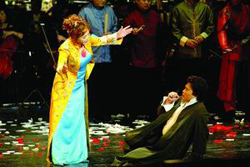
The China Philharmonic Orchestra (CPO) opened its season with a
thrilling concert version Turandot at Poly Theatre over
the weekend, the first time since the orchestra was established in
2000.
The decision indicates CPO director Yu Long's firm steps to
build an all-functional orchestra and hopefully stage a
revival.
Over the past five seasons, the young CPO has produced many
full-length operas including Guo Wenjing's Night Banquet
(Ye Yian) and A Madman's Diary"(Kuangren Riji), Charles
Gounod's Romeo and Juliet, the concert version of
Carmen and the Magic Flute and others.
Yu also serves as artistic director for the annual Beijing Music
Festival, which introduced classic and contemporary operas, such as
Tosca, Lulu, Nabucco and Wagner's
Ring Cycle since the festival started 1998.
However, in the past six years, the China National Opera House
has performed only one original opera (Du Shiniang) and
only a few performances of Carmen, La Traviata,
Madame Butterfly and Tales of Hoffmann.
The CPO and Beijing Music Festival are now staging more operas
in Beijing than the National Opera House.
"Opera is one of the important genres of the Western classic
music, and as China's leading orchestra we have the responsibility
to introduce more diversity of opera productions to the local
audience," Yu told China Daily. "Yes, we are not an opera house,
but we'd like to unite artists from all ways to promote opera in
China. What's more, playing operas is a way to improve the
orchestra's level.
"My players and I would like to challenge ourselves to play more
of Puccini, Verdi or Wagner besides Beethoven and Tchaikovsky."
The CPO will also perform the concert version of Wagner's
Tristan und Isolde next June under the baton of guest
conductor Klaus Weise. The five-hour long opera will be scheduled
to run from 3:30 pm to 10:00.
Tristan und Isolde was the most complex opera written
in its time and remains one of the most intricate operatic
masterpieces to this day.
Richard Strauss wrote: "Tristan und Isolde marked the
end of all romanticism. Here the yearning of the entire 19th
century is gathered in one focal point," indicating that it is a
turning point not only in opera, but in Western art and music.
Wagner generated a complex score, because he wanted to create
the feeling of extreme desire felt by the two main characters with
music. He did this by avoiding and obscuring cadences, which
typically allow the listener to separate various phrases, beginning
points, and especially the end point of a piece or section of
music.
In most operas and musicals, it is very clear when an aria,
duet, chorus, overture, or other ensemble ends, but Wagner blurred
these boundaries.
Yu believes that the China premiere of Tristan und
Isolde will become another milestone in China's music and
culture history after last year's debut of Ring Cycle. Yu
Long's ambition to build an all-functional orchestra is not simply
reflected in his fascination in opera.
He admitted the general condition for classic music in China is
not favorable as people have turned to a variety of forms of
entertainment.
"Most orchestras have to struggle to survive," he said, "and we had
a very low period last year."
Insiders have pointed out that CPO suffered financial difficulty
last season so some of the concerts were cancelled.
But he said the orchestra was overcoming the problem and it will
try to present the best concerts and best season to music
lovers.
The program brochure of the new season shows that Yu and his
orchestra have overcome the hard time.
"Artistic achievement and concert-goers' response are always my
priority," Yu said.
In the new season, the artistic director of CPO will also try
ballet. In November, CPO will collaborate with the Ballet of La
Scala Opera for three shows of Mendelssohn's Midsummer Night's
Dream.
Beside the opera and ballet, CPO will continue to perform
classic symphonic works, its main job, in 2006-07 season, with more
than 30 concerts.
The big names who will come to Beijing to collaborate with CPO
include conductors Riccardo Muti, Pavel Kogan, Okko Kamu, Krzysztof
Penderecki and Philippe Auguin, violinists Augustin Dumay, Renaud
Capucon and Kyoko Takezawa, pianist Barry Douglas and soprano Renee
Flaming,
In addition, Chinese musicians and Chinese works will also play
a major part in the new season. The most wanted pianist Lang Lang,
cellist Wang Jian and conductor/pianist Xu Zhong will all return to
Beijing. Audience will also hear the Chinese-French composer Chen
Qigang's concerto for orchestra and Chinese instruments Iris
Devoilee and the world-known Butterfly Lovers
composed by Chen Gang and He Zhanhao.
The season will end in a concert featuring the twin
Heroes. One is Richard Strauss' Ein Heldenleben
(A Hero's Life) and the other is Guo Wenjing's
Hero.
"At first, I planned Beethoven's Hero to share the
concert with that of Strauss," said Yu.
But he changed his idea. "I think Guo's Hero symphony
is also a great piece and displays the similar power as
Beethoven's. And Strauss' and Guo's in the same concert could be
heard as a dialogue on the same theme between the Western and
Chinese," Yu explained.
(China Daily September 4, 2006)

